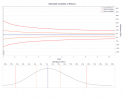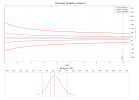Hi All
I am hopefully looking for a steer from the AAM group regarding my finances.
I am 46 years old, married with two children aged 16 and 11.
I have worked in the same job for the past 26 years and I earn 67,500 gross per annum.
My wife does a four day week and she earns €40,000 per annum.
Our joint income into the house is €5467 per month. With myself earning €3041 (after paying into pension) and herself earning €2427
From the outset can I say that we have always worked as a partnership and there was never yours or mine, only ours. We trust each other financially but I always feel a burden that I do the best for both of us, hence the post in this forum.
I currently pay the avc max into my pension and my employer pays in 6%. I am in my company pension for 24 years now and the current value of it is €178000. According to pension projections I will have approx €550,000 in my pension pot at 60 (which is when company pension ends) if I keep paying my AVCs.
My wife doesn’t really believe in pensions and has worked in the public sector since 2006. As she does a four day week she won’t get a full pension on retirement but I don’t know exact details of what she will receive.
Our mortgage is approx €137000 and we have 16 years left to pay on it. We have a tracker mortgage and our current interest rate is 3.85% with repayments being €920 per month. Our house is currently valued at around €700,000.
Last year we came into a little windfall and as a result we have €200,000 sitting in our account. The big question I have is what is the best thing to do with it.
Do we buy a property ?
Do we pay off my mortgage ?
Do we just enjoy it knowing that when I reach 60 I will receive a lump sum of one a half times my salary. It’s only 13 years away.
If needs be we can also downsize when we hit 60 and buy a nice semi detached in a local estate and enjoy the remainder of the money.
For the record I don’t plan on retiring until somewhere between 65 and 68 years.
Any advice appreciated.
I am hopefully looking for a steer from the AAM group regarding my finances.
I am 46 years old, married with two children aged 16 and 11.
I have worked in the same job for the past 26 years and I earn 67,500 gross per annum.
My wife does a four day week and she earns €40,000 per annum.
Our joint income into the house is €5467 per month. With myself earning €3041 (after paying into pension) and herself earning €2427
From the outset can I say that we have always worked as a partnership and there was never yours or mine, only ours. We trust each other financially but I always feel a burden that I do the best for both of us, hence the post in this forum.
I currently pay the avc max into my pension and my employer pays in 6%. I am in my company pension for 24 years now and the current value of it is €178000. According to pension projections I will have approx €550,000 in my pension pot at 60 (which is when company pension ends) if I keep paying my AVCs.
My wife doesn’t really believe in pensions and has worked in the public sector since 2006. As she does a four day week she won’t get a full pension on retirement but I don’t know exact details of what she will receive.
Our mortgage is approx €137000 and we have 16 years left to pay on it. We have a tracker mortgage and our current interest rate is 3.85% with repayments being €920 per month. Our house is currently valued at around €700,000.
Last year we came into a little windfall and as a result we have €200,000 sitting in our account. The big question I have is what is the best thing to do with it.
Do we buy a property ?
Do we pay off my mortgage ?
Do we just enjoy it knowing that when I reach 60 I will receive a lump sum of one a half times my salary. It’s only 13 years away.
If needs be we can also downsize when we hit 60 and buy a nice semi detached in a local estate and enjoy the remainder of the money.
For the record I don’t plan on retiring until somewhere between 65 and 68 years.
Any advice appreciated.
Last edited:

